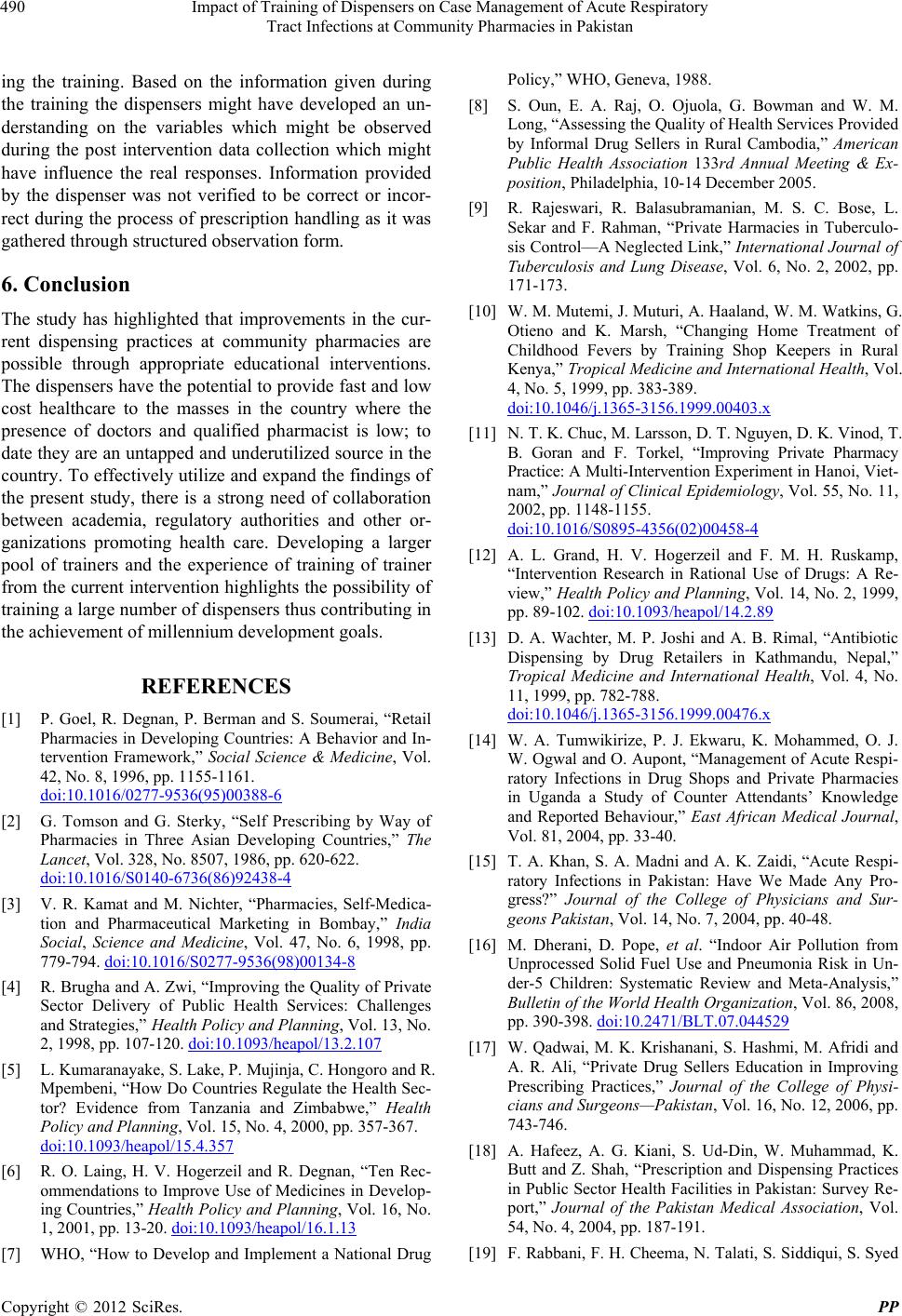
Impact of Training of Dispensers on Case Management of Acute Respiratory
Tract Infections at Community Pharmacies in Pakistan
490
ing the training. Based on the information given during
the training the dispensers might have developed an un-
derstanding on the variables which might be observed
during the post intervention data collection which might
have influence the real responses. Information provided
by the dispenser was not verified to be correct or incor-
rect during the process of prescription handling as it was
gathered through structured observation form.
6. Conclusion
The study has highlighted that improvements in the cur-
rent dispensing practices at community pharmacies are
possible through appropriate educational interventions.
The dispensers have the potential to provide fast and low
cost healthcare to the masses in the country where the
presence of doctors and qualified pharmacist is low; to
date they are an untapped and underutilized source in the
country. To effectively utilize and expand the findings of
the present study, there is a strong need of collaboration
between academia, regulatory authorities and other or-
ganizations promoting health care. Developing a larger
pool of trainers and the experience of training of trainer
from the current intervention highlights the possibility of
training a large number of dispensers thus contributing in
the achievement of millennium development goals.
REFERENCES
[1] P. Goel, R. Degnan, P. Berman and S. Soumerai, “Retail
Pharmacies in Developing Countries: A Behavior and In-
tervention Framework,” Social Science & Medicine, Vol.
42, No. 8, 1996, pp. 1155-1161.
doi:10.1016/0277-9536(95)00388-6
[2] G. Tomson and G. Sterky, “Self Prescribing by Way of
Pharmacies in Three Asian Developing Countries,” The
Lancet, Vol. 328, No. 8507, 1986, pp. 620-622.
doi:10.1016/S0140-6736(86)92438-4
[3] V. R. Kamat and M. Nichter, “Pharmacies, Self-Medica-
tion and Pharmaceutical Marketing in Bombay,” India
Social, Science and Medicine, Vol. 47, No. 6, 1998, pp.
779-794. doi:10.1016/S0277-9536(98)00134-8
[4] R. Brugha and A. Zwi, “Improving the Quality of Private
Sector Delivery of Public Health Services: Challenges
and Strategies,” Health Policy and Planning, Vol. 13, No.
2, 1998, pp. 107-120. doi:10.1093/heapol/13.2.107
[5] L. Kumaranayake, S. Lake, P. Mujinja, C. Hongoro and R.
Mpembeni, “How Do Countries Regulate the Health Sec-
tor? Evidence from Tanzania and Zimbabwe,” Health
Policy and Planning, Vol. 15, No. 4, 2000, pp. 357-367.
doi:10.1093/heapol/15.4.357
[6] R. O. Laing, H. V. Hogerzeil and R. Degnan, “Ten Rec-
ommendations to Improve Use of Medicines in Develop-
ing Countries,” Health Policy and Planning, Vol. 16, No.
1, 2001, pp. 13-20. doi:10.1093/heapol/16.1.13
[7] WHO, “How to Develop and Implement a National Drug
Policy,” WHO, Geneva, 1988.
[8] S. Oun, E. A. Raj, O. Ojuola, G. Bowman and W. M.
Long, “Assessing the Quality of Health Services Provided
by Informal Drug Sellers in Rural Cambodia,” American
Public Health Association 133rd Annual Meeting & Ex-
position, Philadelphia, 10-14 December 2005.
[9] R. Rajeswari, R. Balasubramanian, M. S. C. Bose, L.
Sekar and F. Rahman, “Private Harmacies in Tuberculo-
sis Control—A Neglected Link,” International Journal of
Tuberculosis and Lung Disease, Vol. 6, No. 2, 2002, pp.
171-173.
[10] W. M. Mutemi, J. Muturi, A. Haaland, W. M. Watkins, G.
Otieno and K. Marsh, “Changing Home Treatment of
Childhood Fevers by Training Shop Keepers in Rural
Kenya,” Tropical Medicine and International Health, Vol.
4, No. 5, 1999, pp. 383-389.
doi:10.1046/j.1365-3156.1999.00403.x
[11] N. T. K. Chuc, M. Larsson, D. T. Nguyen, D. K. Vinod, T.
B. Goran and F. Torkel, “Improving Private Pharmacy
Practice: A Multi-Intervention Experiment in Hanoi, Viet-
nam,” Journal of Clinical Epidemiology, Vol. 55, No. 11,
2002, pp. 1148-1155.
doi:10.1016/S0895-4356(02)00458-4
[12] A. L. Grand, H. V. Hogerzeil and F. M. H. Ruskamp,
“Intervention Research in Rational Use of Drugs: A Re-
view,” Health Policy and Planning, Vol. 14, No. 2, 1999,
pp. 89-102. doi:10.1093/heapol/14.2.89
[13] D. A. Wachter, M. P. Joshi and A. B. Rimal, “Antibiotic
Dispensing by Drug Retailers in Kathmandu, Nepal,”
Tropical Medicine and International Health, Vol. 4, No.
11, 1999, pp. 782-788.
doi:10.1046/j.1365-3156.1999.00476.x
[14] W. A. Tumwikirize, P. J. Ekwaru, K. Mohammed, O. J.
W. Ogwal and O. Aupont, “Management of Acute Respi-
ratory Infections in Drug Shops and Private Pharmacies
in Uganda a Study of Counter Attendants’ Knowledge
and Reported Behaviour,” East African Medical Journal,
Vol. 81, 2004, pp. 33-40.
[15] T. A. Khan, S. A. Madni and A. K. Zaidi, “Acute Respi-
ratory Infections in Pakistan: Have We Made Any Pro-
gress?” Journal of the College of Physicians and Sur-
geons Pakistan, Vol. 14, No. 7, 2004, pp. 40-48.
[16] M. Dherani, D. Pope, et al. “Indoor Air Pollution from
Unprocessed Solid Fuel Use and Pneumonia Risk in Un-
der-5 Children: Systematic Review and Meta-Analysis,”
Bulletin of the World Health Organization, Vol. 86, 2008,
pp. 390-398. doi:10.2471/BLT.07.044529
[17] W. Qadwai, M. K. Krishanani, S. Hashmi, M. Afridi and
A. R. Ali, “Private Drug Sellers Education in Improving
Prescribing Practices,” Journal of the College of Physi-
cians and Surgeons—Pakistan, Vol. 16, No. 12, 2006, pp.
743-746.
[18] A. Hafeez, A. G. Kiani, S. Ud-Din, W. Muhammad, K.
Butt and Z. Shah, “Prescription and Dispensing Practices
in Public Sector Health Facilities in Pakistan: Survey Re-
port,” Journal of the Pakistan Medical Association, Vol.
54, No. 4, 2004, pp. 187-191.
[19] F. Rabbani, F. H. Cheema, N. Talati, S. Siddiqui, S. Syed
Copyright © 2012 SciRes. PP